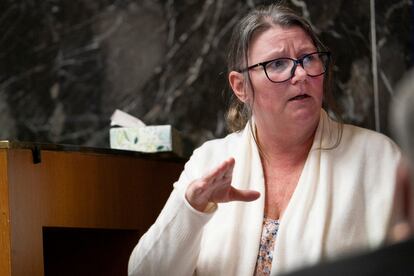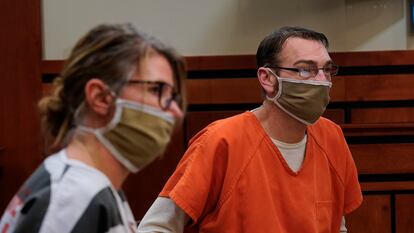Mother of Michigan school shooter convicted of manslaughter
Prosecutors said Jennifer Crumbley was grossly negligent and did not do enough to prevent her son, Ethan, from killing four teenagers at his high school


The Christmas gift came early that year. The morning after Thanksgiving 2021, James Crumbley took his 15-year-old son to a gun shop to buy him a Sig Sauger semiautomatic nine-millimeter, which Ethan, the boy, referred to on social media as his “new beauty.” Four days later, the boy smuggled the gun into his high school in Oxford, a suburb about 60 miles from Detroit, Michigan. He went into the restroom, took the gun out of his backpack and began shooting everyone he came across: he killed four schoolmates, aged between 14 and 17, and wounded seven others, including a teacher. His mother, Jennifer Crumbley, was convicted this Tuesday of four counts of involuntary manslaughter by a jury of six men and six women. It is a decision that sets a historic precedent on the responsibility that parents bear when their children carry out massacres such as this one.
Two things, above all others, contributed to the guilty verdict, reached unanimously on the second day of deliberations after some 10 hours of debate: the fact that she took Ethan to test the gun at a shooting range that weekend, and a message she sent him when the parents were summoned by the school in response to the alarm of a teacher who saw the boy the day before the tragedy looking on his cell phone for information on how to get ammunition. They were summoned by phone, a call that left a trace on the answering machine, and by email. They did not reply to either message, but the mother did text her son: “LOL, I’m not mad at you. You have to learn not to get caught.”

Jennifer Crumbley’s defense tried during the trial, held in Pontiac, Michigan, to place the blame on her husband for not locking up the gun, the school for not warning her of the teenager’s behavioral problems, and her son himself for pulling the trigger and killing the four students. “Can every parent really be responsible for everything their children do?” attorney Shannon Smith asked in her closing argument. “This was not foreseeable to Mrs. Crumbley,” she added.
In another intervention, Smith quoted part of the lyrics of Bad Blood by Taylor Swift, a singer-songwriter whose influence is almost impossible to escape in the United States nowadays, in which Swift says that there are “band-aids don’t fix bullet holes.” According to her argument, the prosecution was “attempting to put a Band-Aid on problems that can’t be fixed with a Band-Aid.” “In this case, a Band-Aid will never bring back the lives that were lost,” she said.
Life in prison without parole
The prosecution, for its part, presented the court the image of an erratic mother, more concerned with her love of horses and an extramarital affair than with the deteriorating mental health symptoms of her only child.
Ethan Crumbley was charged with terrorism, allowing him to be tried as an adult and sentenced last December to the maximum penalty: life in prison without parole. After learning what their son had done, the couple went on the run. They were found a few days later not far from home: in the city of Detroit, while they were in a shopping mall. That Saturday morning, the couple was arraigned and heard the charges via videoconference, to which they pleaded not guilty. The father will be tried in March for the same crimes as her.
With the case, Oakland County prosecutor Karen D. McDonald saw an opportunity to punish parents who could — as the jury has found proven — have prevented their son from perpetrating such killings, especially after they were alerted a few hours before the shooting that he had been caught at school drawing a gun in a notebook, with a text that read: ‘Help me,’ ‘My life is useless,’ ‘The world is dead,’ and ‘Blood everywhere.’
The Crumbleys went to the school, but, according to the indictment, they acted negligently when they failed to force the teenager to show them what was in his backpack. They were also negligent for refusing to take him home with them and for allowing him to return to class.
When at 1:22 p.m., 32 minutes after Ethan emerged armed from the bathroom, the first news broke that there was an active shooter at her son’s high school, his mother texted him another message, “Ethan, don’t do it.” James Crumbley then ran home, where he found that the gun was not in its place, a place that was unlocked. At 1:37 p.m., he then called the police to warn that he suspected his son might be the attacker. When the police showed up at the high school and subdued him, the boy still had 15 rounds of ammunition left.
The shooting prompted Michigan to enact a law to regulate minors’ access to parental guns. School shootings are a recurring nightmare in the United States, since Columbine High School in 1999, when two friends killed 13 people and ushered in a new era of mass shootings in the country. Many of those shootings have taken place in schools: from Sandy Hook in 2012 in Newtown (Connecticut; 26 dead, 20 of them minors) to Parkland in 2019 (Florida; 17 fatalities) or Uvalde in 2022 (Texas, 19 children and two teachers). The Crumbley killings counted as the deadliest school shooting of its year.
U.S. gun control associations have supported the idea of prosecuting Ethan’s parents, though some have come out against the trial. In an opinion piece published by The New York Times, Megan K. Stack wondered about the sense of trying a minor as an adult in order to sentence him to the maximum penalty, while holding the parents responsible for what their child did. “There is a logical contradiction in the state declaring Ethan Crumbley an adult — with full responsibility for his crime — while prosecuting his parents for gross negligence in child care. Ethan Crumbley was a child, or he wasn’t. He was responsible for his actions, or his parents were. Can the state argue both positions at once? Prosecutors insist they can.”
As demonstrated Tuesday, a Pontiac (Michigan) jury believes they can.
Sign up for our weekly newsletter to get more English-language news coverage from EL PAÍS USA Edition
Tu suscripción se está usando en otro dispositivo
¿Quieres añadir otro usuario a tu suscripción?
Si continúas leyendo en este dispositivo, no se podrá leer en el otro.
FlechaTu suscripción se está usando en otro dispositivo y solo puedes acceder a EL PAÍS desde un dispositivo a la vez.
Si quieres compartir tu cuenta, cambia tu suscripción a la modalidad Premium, así podrás añadir otro usuario. Cada uno accederá con su propia cuenta de email, lo que os permitirá personalizar vuestra experiencia en EL PAÍS.
¿Tienes una suscripción de empresa? Accede aquí para contratar más cuentas.
En el caso de no saber quién está usando tu cuenta, te recomendamos cambiar tu contraseña aquí.
Si decides continuar compartiendo tu cuenta, este mensaje se mostrará en tu dispositivo y en el de la otra persona que está usando tu cuenta de forma indefinida, afectando a tu experiencia de lectura. Puedes consultar aquí los términos y condiciones de la suscripción digital.








































